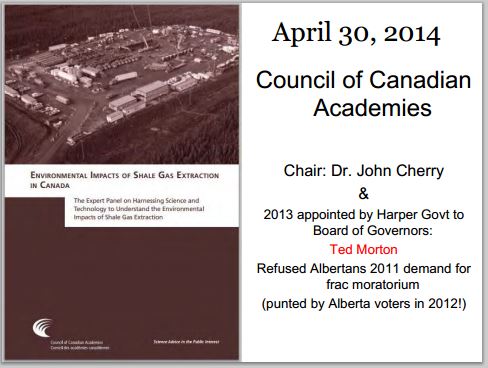Discussion Paper: Potential Socioeconomic Effects of Unconventional Oil and Gas Development in Nova Scotia Communities, Nova Scotia Hydraulic Fracturing Independent Review and Public Engagement Process June 26, 2014
Lead Author: Dr. Shawn Dalton
Expert Panellists: Dr. Frank Atherton, Dr. Michael Bradfield, Kevin Christmas, Dr. Maurice Dusseault, Dr. Graham Gagnon, Dr. Brad Hayes, Constance MacIntosh, Dr. Ian Mauro, & Ray Ritcey
Supporting Contributors: Margo MacGregor & Dr. David Wheeler
6. Conclusion
…
Should Nova Scotia move forward with unconventional oil and gas development, we recommend that this absence of knowledge be addressed through the creation of an independent, long-term social ecological monitoring program. [Emphasis added]


Slides from Ernst presentation in Courtenay BC, May 24, 2014
Fracking impact on communities unclear: Nova Scotia study, Province’s limited experience with fracking is cause for concern, says study by The Canadian Press, June 27, 2014, CBC News
A new study on the potential for hydraulic fracturing in Nova Scotia says there just isn’t enough research available to draw firm conclusions about the impact on communities. … “The literature regarding socioeconomic effects of unconventional oil and gas development on communities is just beginning to emerge,” said the study’s lead author, social ecologist Shawn Dalton. “Because community research is often oriented toward problem-solving, there is a dearth of information regarding when shale oil and gas extraction … has gone well, and a relative abundance of reports on challenges and problems — most of it centred on communities in the U.S.” [Why ignore the many problems and challenges that have occurred in Canada?]
Dalton’s study said the American experience with fracking is unlikely to be repeated in Canada. “Some of the incidents and accidents that have happened in the States may be less likely to occur here,” the report said. “Canada’s regulatory regimes tend to be more restrictive, and because of the observed experiences in the U.S., more safeguards were adopted in Canada before horizontal, multi-fracked wells became common in this country.” [Because of the observed experiences in the US and Canada, the regulators federally and provincially have been deregulating as fast as they can get away with, in Alberta for the past decade. The incidents happening in Canada, are the same as those happening in the USA and are easily studied, if the “experts” bother to look.The Council of Canadian Academies didn’t bother to look either.]
However, the report makes it clear that Nova Scotia’s limited experience with fracking is cause for concern.
Test wells ‘poorly managed’
Dalton says the cleanup of a handful of test wells that were fracked near Kennetcook about six years ago “has been poorly managed by government and industry.” “The community of Kennetcook remains the site of two open ponds containing fracking wastewater, and the company that created the ponds … is no longer operating in Nova Scotia.”
Dalton’s study, released late Thursday, will form the basis of a chapter in a report to be produced later this year by an independent expert panel appointed by the province in February. Nova Scotia is under pressure to develop its unconventional oil and gas resources because it is facing a dwindling population and fiscal challenges, the study says. [Did government and CAPP et al tell the panel to say this?]
The report also says energy companies hoping to drill in unproved areas with little or no industry services — like Nova Scotia — are facing extreme risk due to high costs and “vociferous opposition” from protest groups like those found in New Brunswick. “New Brunswick has moved ahead with … hydraulic fracturing in unconventional reservoirs, but not without considerable resistance from various actors in the community,” the study said.
‘Who wants to be a lab rat?’
Marilyn Cameron, an environmental activist and farmer in rural Nova Scotia, said the study supports the view that Nova Scotia’s two-year-old moratorium on fracking should remain in place. Cameron said Dalton’s study says virtually nothing about agriculture or rural economies even though all of the areas in the province that have shown promise for shale deposits are in rural areas. “She said we didn’t have enough information,” Cameron said Friday in an interview from her fruit and garlic farm in Grafton.
Cameron also criticized Dalton’s recommendation to proceed with a so-called “human ecosystem framework” study should Nova Scotia grant a go-ahead to the fracking industry.
“How will monitoring prevent harm from happening?” Cameron asked. “Who wants to be a lab rat so that the industry can learn from our experiences?”
At the very least, Cameron said, the Nova Scotia government should seek the consent of rural residents before making any decisions. [Emphasis added]
[Refer also to:
Jessica talks about the government, industry and regulators making the same promise a decade ago to Albertans that Shawn Dalton is reported making now to Nova Scotians. The Alberta promise was a lie.
